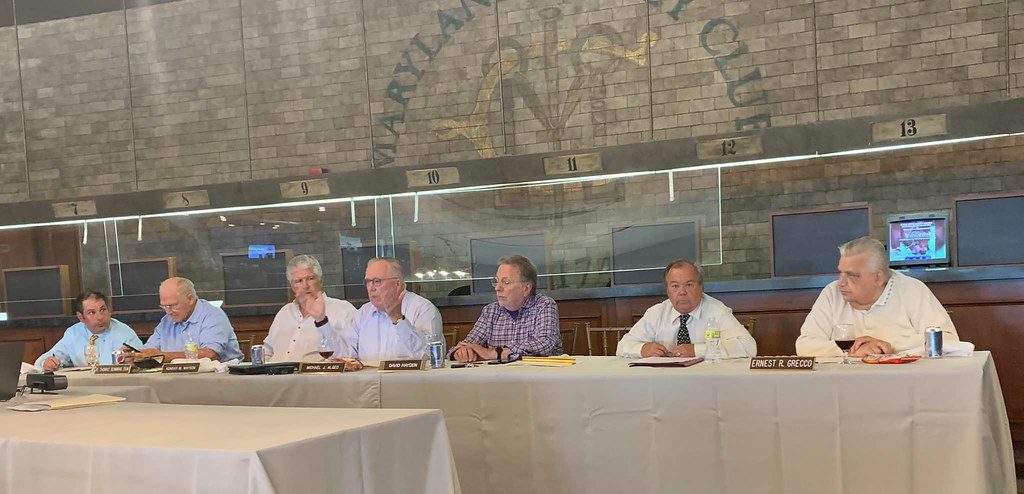Bobby Lillis hopes to give backstretch “an ear” at MRC
He may be the newest member of the Maryland Racing Commission, but Bobby Lillis is pretty familiar to just about everyone around Maryland racing.
Lillis, retired jockey, retired head of the Maryland Horsemen’s Assistance Foundation, and guy who’s done just about every racing job imaginable, took on a new role June 7 when he became a commissioner. Lillis replaces Clarissa Coughlin, who resigned with one year remaining in her four-year term. The term Lillis is serving expires June 30, 2023, though he is eligible to be reappointed at that time.
“When I retired about a year and a half ago, I thought to myself, ‘I started out 50 years ago in the industry and worked my way through the progressions and just thought, I’ve done everything except for being a Racing Commissioner,’” Lillis said.
Now he’ll be able to check off that box, too.
Lillis comes aboard at an interesting moment for the Commission – indeed, for state racing commissions nationwide. The federally mandated Horseracing Integrity and Safety Authority (HISA) is coming alive in stages. Its purview is broad – pretty much everything related to safety and integrity — touches on a vast swath of the sport, and it will preempt state commissions on what it chooses to regulate.
At the same time, there is enormous uncertainty as to what the future will hold. HISA is embroiled in multiple lawsuits testing whether the program is constitutionally valid. And some horsemen are anxious that they are being asked to agree to rules they don’t understand, aren’t aware of, and in some cases that are not yet final.
- Derby runner Sandman arrives at Churchill Downs
 Sandman, rallying winner of the Arkansas Derby last weekend, arrived at Churchill Downs this morning to train for the Kentucky Derby.
Sandman, rallying winner of the Arkansas Derby last weekend, arrived at Churchill Downs this morning to train for the Kentucky Derby.
In order to participate in racing going forward, trainers and other licensed people considered as “covered persons” under the law must sign an “agreement by the covered person to be subject to and comply with the rules, standards, and procedures developed and approved” by HISA.
Some HISA rules – those involving medication and anti-doping, for example – are not yet final.
One longtime Maryland trainer, Dale Capuano, raised those concerns during Tuesday’s Commission meeting.
“I need to do some homework on [HISA],” Lillis said afterwards. “From what I can tell, there’s a whole lot of controversy out there and a whole lot of frustration, where people feel like they’re forced to sign and they’re not really aware of what they’re agreeing to.”
Lillis, a Michigan native who has lived in Maryland since 1976, when he was plying his trade as a jockey at Laurel, Pimlico, and Bowie, has a background unlike any other of his fellow Commissioners. For one thing, he’s worked with both Thoroughbreds and standardbreds.
For another, while most Commissioners are owners or breeders – or not affiliated with the industry at all – Lillis has been a jockey, exercise rider, parking lot attendant and head of the assistance fund, which exists, according to its website, to “provide financial assistance for extraordinary circumstances to eligible employees actively working at Maryland race tracks and/or thoroughbred farms.”
That background perhaps gives him a different view of the industry than some have.
“I would like to see the backstretch people have more of a voice sometimes. Through the years backstretch employees have some valid concerns,” Lillis said of one of his goals. “Certainly with me at the table, backstretch employees will have an ear at the Commission.”
- Coal Battle’s West Virginia connection
 Kentucky Derby contender Coal Battle has a couple of big fans in West Virginia, whose connection is through the horse’s WV-bred dam.
Kentucky Derby contender Coal Battle has a couple of big fans in West Virginia, whose connection is through the horse’s WV-bred dam.
Beyond HISA, the racing industry faces a variety of challenges, both in Maryland and nationally. Wagering handle nationally continues to be a concern and is far below what it would be had it kept pace with inflation over the last 20 years.
The national foal crop is about half of what it was in 2000, and Maryland’s is likewise about half of what it was then. Those facts are putting enormous pressure on field sizes everywhere.
And in Maryland, there is the matter of what happens to Laurel and Pimlico, and the related expiration of the 10-year deal that has governed racing the last decade. The Commission was a major force in the creation of the original 10-year agreement; whether it opts to play a meaningful role in its renewal remains to be seen.
All of which is to say that in his new role, onetime jockey Bobby Lillis could be in for yet another eventful ride.
“I would like to see the industry continue because the livelihoods of many are at stake all the time,” he said. “I’m very passionate about the sport, very fair with my decisions. I want to see the Maryland horse racing industry succeed, and that includes all breeds.”
PHOTOS
LATEST NEWS



















